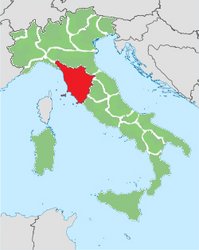Italy

Tuscany is a region in central Italy with a population of about 3.8 million inhabitants.
The study area is located in the Mediterranean biographical region and the main soil type is Cambisol. The total size of the study area is 2,300,000 ha of which 809,487 ha is utilised agricultural area.
Key agricultural facts
Zealand Denmark | Eastern Scotland | Mazovia Poland | Közép Mag. Hungary | Toscany Italy | Jaén Spain | |
| Total number of farm holdings | 7.850 | 6.610 | 302.290 | 62.080 | 78.900 | 254.293 |
| Average farm size [ha] | 61 | 196 | 7 | 5 | 10 | 18 |
| Farm holdings < 5 ha [%] | 4 | 15 | 55 | 94 | 62 | 60 |
| Farm holdings > 50 ha[%] | 32 | 60 | 1 | 1 | 3 | 6 |
| Owner occupied[%] | 72 | 65 | 89 | 36 | 75 | 79 |
Source: Eurostat data, 2010
The average farm size in Tuscany is 10 ha, which is slightly less than the European Union average of 15 ha. The majority of the holdings are less than 5 ha (62%) with only 3% of holdings over 50 ha. The dominant farming systems are cereals, potatoes, olives and grapes (for Chianti wine). Arable crops are grown on 65% of the land, whilst olives and wine are 12% and 8% respectively. Around 75% of the farmed land is owner occupied which is close to the EU average of about 70%.
The viticultural sector production represents 18% of the gross saleable production of Tuscany, being the second most important sector of local agriculture after the horticulture and nursery gardening sector.